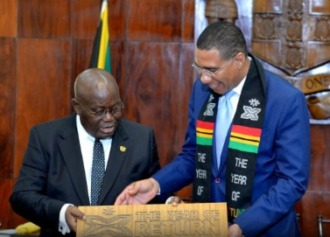Debt-shackled Jamaica’s interest payments as a percentage of gross domestic product were the highest in the world last year even after a domestic debt restructuring two years ago, according to a Washington-based think tank.
A new report on Jamaica’s economy by the Center for Economic and Policy Research says the heavily-indebted Caribbean country’s total interest payments were about $1.4 billion in 2011, or about 10 percent of GDP. That’s about two-and-a-half times what was spent on capital programs.
On Wednesday, economist and center co-director Mark Weisbrot said that it was the highest percentage anywhere in the world, even in crisis-staggered countries in the 17-nation Eurozone.
For years, roughly half of the Jamaican government’s budget has been dedicated to paying the debt, and that has forced the middle-income country to scrimp on schools, hospitals and infrastructure.
“The burden of excessively high interest payments will continue to displace public investments, which are needed to restore normal growth and bring down the persistently high levels of poverty and unemployment,” the group said in its report.
Ministry of finance officials did not immediately respond to calls seeking comment about the group’s report.
Jamaica’s economy has sputtered for decades. The island’s economy grew by 1.5 percent last year after three years of negative growth rates, but the economy still remains below its 2008 level of GDP, the group said.
Overall, Jamaica’s debt was about 130 percent of gross domestic product last year.
Jamaican analysts say that much of the island’s public debt was derived from bad bank loans that the government absorbed to resolve a mid-1990s crisis when dozens of banks failed amid a spree of lending.
By 2010, Jamaica’s towering debt and the damaging impact of the global recession forced the government to again seek assistance from the International Monetary Fund. It helped the government carry out a domestic debt restructuring and provided $1.27 billion in a standby loan. It also unlocked funding from other global lending groups.
But the Center for Economic and Policy Research believes that the 2010 domestic debt restructuring program did little to solve the underlying problem even if it did reduce interest payments in the short term.
Jamaica is currently trying to forge a new agreement with the IMF.
Weisbrot said a key sticking point between the IMF and the Jamaica government is the cap on the public sector wage bill.
“It’s clear workers have had enough of wage freezes, yet if the Jamaican government is unable to ensure more accommodating policy conditions from the IMF, the likelihood of further wage freezes or layoffs is definitely a possibility,” said Weisbrot.
But he believes such measures would only further weaken the economy.
The island’s last agreement with the IMF stalled last year under the previous Jamaica Labor Party-led government.


